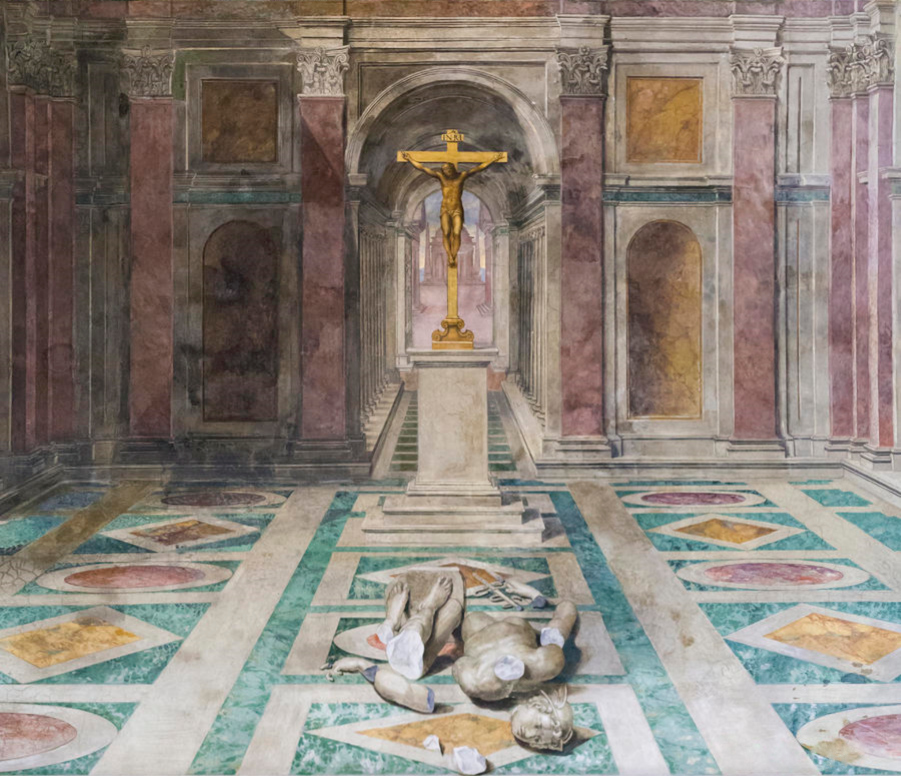| Revision as of 01:07, 28 July 2003 editDW40 (talk | contribs)39 editsm cosmology← Previous edit | Revision as of 01:35, 28 July 2003 edit undoMikeS (talk | contribs)19 editsNo edit summaryNext edit → | ||
| Line 15: | Line 15: | ||
| The image of constant barbarian warfare amid the ruins of the Roman empire continues to depict popular conceptions of the Dark Ages, influencing the creation of characters such as ]. The literature of ] also emerges from this confused period, as civilised urban and Christian Roman cultures attempted to defend themselves against expanding pagan tribes. The struggle between Christian and magical-pagan belief systems in the Arthurian romances epitomises this. | The image of constant barbarian warfare amid the ruins of the Roman empire continues to depict popular conceptions of the Dark Ages, influencing the creation of characters such as ]. The literature of ] also emerges from this confused period, as civilised urban and Christian Roman cultures attempted to defend themselves against expanding pagan tribes. The struggle between Christian and magical-pagan belief systems in the Arthurian romances epitomises this. | ||
| Those familiar with the developments during the "Dark Ages" find the old view obsolete and, to some, even embarrasing. To ignore the developments in science, art and medicine during this period may be a result of focusing only on "Western" Europe and ignoring the developments in Spain (southwest of France), Sicily and elsewhere. Even John of Salisbury knew better. When he wanted to study philosophy he went to Sicily. | |||
| The books of Aristotle were saved and preserved in the Arab Empire, some acknowledgment seems proper. Two of the greatest philosophers of the times were Rabbi Moses Maimonides and Judge Ibn Rusd (Averroes). Scholars from Greece, England, Germany and elsewhere had free passage to study in learning and translation centers in Toledo, Sicily and elsewhere. Perhaps it is time to bring light to the dark ages. | |||
| ------- | |||
| ] | ] | ||
Revision as of 01:35, 28 July 2003
In cosmology's Big Bang theory, the term "dark ages" refers to periods of comparatively little starlight emission, during the early formation of the universe. This would have occurred after decoupling and before the first burst of star formation. Although there was little starlight during this period, there was a substantial degree of electromagnetic radiation resulting from the "Big Bang" explosion.
"Triumph of Christianity" by Tommaso Laureti (1530-1602), ceiling painting in the Sala di Constantino, Vatican Palace. Images like this one symbolize the destruction of ancient pagan culture and the "victory" of Christianity.
The Dark Ages were the dark (in the sense of obscure) years in Europe after the fall of the Western Roman Empire, when so-called 'barbarian'—generally non-literate—tribes took over the land formerly under Roman Imperial control. It was a period of widespread population movement, particularly, though not only, among Germanic peoples (the Völkerwanderung). The lack of written history during this period, combined with political and social instability, meant that relatively little was known about it. Though archaeological finds have changed this situation to some extent, much is still unknown about this period.
There are no clear starting or ending points for the Dark Ages, though the half-millennium period from the Vandal sack of Rome (455CE) to the year 1000CE is commonly used, although European politics were substantially stabilized with the crowning of Charlemange as Holy Roman Emperor in 800CE.
The negative connotations of the expression Dark Ages have made it unpopular among historians of this period. The term Early Medieval is often preferred. The continuities between Dark Age society and late imperial Rome have been stressed by some writers, who wish to emphasise that medieval culture was already developing in the empire, and indeed continued to do so in the unconquered eastern (Byzantine) portion of the empire. However, many of the tribes who took over imperial land were initially pagan. The development of a solidly Christian Europe, in opposition to an Islamic empire based in North Africa and the Middle East, marks a major cultural and political shift, as does the development of the feudal system. With this, and the cultural developments after the Carolingian renaissance, the concept of the Dark Ages ceases to be meaningful. The "darkest" period is probably the Seventh Century (600-700BCE), co-inciding with the near collapse of the Byzantine empire from invasion first from the Persian Empire and later the Islamic takeover of the southern and eastern Mediterranean.
The image of constant barbarian warfare amid the ruins of the Roman empire continues to depict popular conceptions of the Dark Ages, influencing the creation of characters such as Conan the Barbarian. The literature of King Arthur also emerges from this confused period, as civilised urban and Christian Roman cultures attempted to defend themselves against expanding pagan tribes. The struggle between Christian and magical-pagan belief systems in the Arthurian romances epitomises this.
Those familiar with the developments during the "Dark Ages" find the old view obsolete and, to some, even embarrasing. To ignore the developments in science, art and medicine during this period may be a result of focusing only on "Western" Europe and ignoring the developments in Spain (southwest of France), Sicily and elsewhere. Even John of Salisbury knew better. When he wanted to study philosophy he went to Sicily. The books of Aristotle were saved and preserved in the Arab Empire, some acknowledgment seems proper. Two of the greatest philosophers of the times were Rabbi Moses Maimonides and Judge Ibn Rusd (Averroes). Scholars from Greece, England, Germany and elsewhere had free passage to study in learning and translation centers in Toledo, Sicily and elsewhere. Perhaps it is time to bring light to the dark ages.
